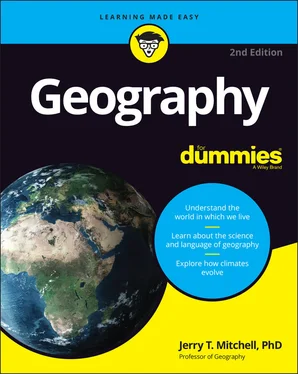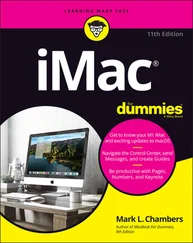Jerry T. Mitchell - Geography For Dummies
Здесь есть возможность читать онлайн «Jerry T. Mitchell - Geography For Dummies» — ознакомительный отрывок электронной книги совершенно бесплатно, а после прочтения отрывка купить полную версию. В некоторых случаях можно слушать аудио, скачать через торрент в формате fb2 и присутствует краткое содержание. Жанр: unrecognised, на английском языке. Описание произведения, (предисловие) а так же отзывы посетителей доступны на портале библиотеки ЛибКат.
- Название:Geography For Dummies
- Автор:
- Жанр:
- Год:неизвестен
- ISBN:нет данных
- Рейтинг книги:5 / 5. Голосов: 1
-
Избранное:Добавить в избранное
- Отзывы:
-
Ваша оценка:
- 100
- 1
- 2
- 3
- 4
- 5
Geography For Dummies: краткое содержание, описание и аннотация
Предлагаем к чтению аннотацию, описание, краткое содержание или предисловие (зависит от того, что написал сам автор книги «Geography For Dummies»). Если вы не нашли необходимую информацию о книге — напишите в комментариях, мы постараемся отыскать её.
Geography For Dummies
Geography For Dummies
Geography For Dummies — читать онлайн ознакомительный отрывок
Ниже представлен текст книги, разбитый по страницам. Система сохранения места последней прочитанной страницы, позволяет с удобством читать онлайн бесплатно книгу «Geography For Dummies», без необходимости каждый раз заново искать на чём Вы остановились. Поставьте закладку, и сможете в любой момент перейти на страницу, на которой закончили чтение.
Интервал:
Закладка:
In this part, you will discover the key concepts and methods of contemporary geography as well as the principal tools and techniques of the trade. Among other things you will see how exciting technologies are giving geographers unprecedented perspectives on where and why.
Chapter 1
Geography: The Why of Where and Why You Should Care
IN THIS CHAPTER
 Contemplating a complex planet
Contemplating a complex planet
 Unearthing myths
Unearthing myths
 Tracing the ancient roots of geography to the modern discipline
Tracing the ancient roots of geography to the modern discipline
 Finding a new way to look at geography
Finding a new way to look at geography
 Going over some basic concepts
Going over some basic concepts
“We should cross here .”
Staring at the broad expanse of the Galana River in southern Kenya, my response to our guide was to tilt my head to the side and say incredulously, “Are you sure?” After all, I could look further upstream and see that the river was narrower and there were some rocks we could use to hop across. Why on Earth should we cross at the widest and deepest part? I don’t mind getting wet, but a chest-deep slog just didn’t make sense to me.
“Well, we could cross up there,” our guide said while pointing toward the rocks, “but that’s also where the crocodiles hang out. We will do better down here to walk in a group, splashing as we go to mimic a large elephant.” And so we did, and no one in our group became a croc’s lunch.
What we discover from this anecdote is that what makes sense in one place — say, something as simple as crossing a river on a set of rocks — is a really bad decision somewhere else. Place matters . In this case, it really was a life-or-death situation.
That short story should also make it quite plain that you live on a very interesting planet. Earth is a world of never-ending variety — mountains and plains, deserts and forests, oceans and croc-infested rivers. If, as Shakespeare once wrote, “All the world’s a stage,” then one could hardly imagine a greater range of sets and scenery than exists on planet Earth.
You are an actor on that stage, and you are not alone. The entire cast numbers nearly 8 billion, and they are as diverse as their Earthly stage. They practice dozens of religions, speak many hundreds of languages, and display thousands of cultures. They live in scattered farmhouses, large cities, and every size settlement in between. They practice every kind of livelihood imaginable and, in innumerable ways great and small, have interacted with and changed the natural environment forever.
So “interesting planet” and “never-ending variety” turn out to be code for “complex.” Truly, this is a complex world in which no two areas are exactly alike. On the one hand, this complexity makes for a very fascinating planet. But on the other hand, the prospect of learning all about this complexity can be overwhelming, or at least sometimes seems to be. Fortunately, one subject seeks to make sense of it all and, usually, does a pretty good job: Geography.
Geography: Making Sense of it All
People are fascinated by the world in which they live. They want to know what it’s like and why it is the way it is. Most importantly, they want to understand their place in it. Geography satisfies this curiosity and provides practical knowledge and skills that people find useful in their personal and professional lives. This is nothing new.
From ancient roots …
 Geography comes from two ancient Greek words: ge, meaning “Earth,” and graphe, meaning “to describe.” So, when the ancient Greeks practiced geography, they described Earth. Stated less literally, they noted the location of things, recorded the characteristics of areas near and far, and used that information in matters of trade, commerce, communication, and administration.
Geography comes from two ancient Greek words: ge, meaning “Earth,” and graphe, meaning “to describe.” So, when the ancient Greeks practiced geography, they described Earth. Stated less literally, they noted the location of things, recorded the characteristics of areas near and far, and used that information in matters of trade, commerce, communication, and administration.
Disputed paternity
A Greek named Eratosthenes (died about 192 B.C.) is sometimes called the “Father of Geography” since he coined the word “geography.” The Greeks themselves called Homer the “Father of Geography” because his epic poem, Odyssey , written about a thousand years before Eratosthenes was born, is the oldest account of the fringe of the Greek world. In addition to these gentlemen, at least two other men have been named “Father of Geography,” all of which suggests a very interesting paternity suit. But I digress. That the story goes back to the days of the Greeks tells us that geography is a very old subject. This is not to say that others, say Arabs or the Chinese, were not also thinking about how to describe Earth. People of every age and culture have sought to know and understand their immediate surroundings and the world beyond. They stood at the edges of seas and imagined distant shores. They wondered what lies on the other side of a mountain or beyond the horizon. Ultimately, of course, they acted upon those speculations. They explored. They left old lands and occupied new lands. And as a result, millennia later, explorers such as Columbus, Magellan, and others found humans almost everywhere they went.
Links to exploration
 Geographers from ancient Greece through the 19th century were largely devoted to exploring the world, gathering information about newly found (to them!) lands, and indicating their locations as accurately as possible on maps. Sometimes the great explorers and thinkers got it right, and sometimes they did not (see the sidebar called “Measuring the Earth”). But in any event, geography and exploration became intertwined; so, “doing geography” became closely associated with making maps, studying maps, and memorizing the locations of things (see Chapters 3through 5for information on locating things and creating and reading maps).
Geographers from ancient Greece through the 19th century were largely devoted to exploring the world, gathering information about newly found (to them!) lands, and indicating their locations as accurately as possible on maps. Sometimes the great explorers and thinkers got it right, and sometimes they did not (see the sidebar called “Measuring the Earth”). But in any event, geography and exploration became intertwined; so, “doing geography” became closely associated with making maps, studying maps, and memorizing the locations of things (see Chapters 3through 5for information on locating things and creating and reading maps).
… To modern discipline
During the past two centuries, and especially during the past several decades, geography has blossomed and diversified. Old approaches that focused on location and description have been complemented by new approaches that emphasize analysis, explanation, and significance. On top of that, satellites, computers, and other technologies now allow geographers to record and analyze information about Earth to an extent and degree of sophistication that were unimaginable just a few years ago.
 MEASURING THE EARTH
MEASURING THE EARTH
In the third century B.C., the Greek scholar Eratosthenes made a remarkably accurate measurement of Earth’s circumference. At Syene (near Aswan, Egypt), the sun illuminated the bottom of a well only one day every year. Eratosthenes inferred correctly this could only happen if the sun were directly overhead the well — that is, 90° above the horizon. By comparing that sun angle with another one measured in Alexandria, Egypt, on the same day the sun was directly overhead at Syene, Eratosthenes deduced that the distance between the two locations was one-fiftieth (1/50th) of Earth’s circumference. Thus, if he could measure the distance from Syene to Alexandria and multiply that number times 50, the answer would be the distance around the entire Earth.
Читать дальшеИнтервал:
Закладка:
Похожие книги на «Geography For Dummies»
Представляем Вашему вниманию похожие книги на «Geography For Dummies» списком для выбора. Мы отобрали схожую по названию и смыслу литературу в надежде предоставить читателям больше вариантов отыскать новые, интересные, ещё непрочитанные произведения.
Обсуждение, отзывы о книге «Geography For Dummies» и просто собственные мнения читателей. Оставьте ваши комментарии, напишите, что Вы думаете о произведении, его смысле или главных героях. Укажите что конкретно понравилось, а что нет, и почему Вы так считаете.












